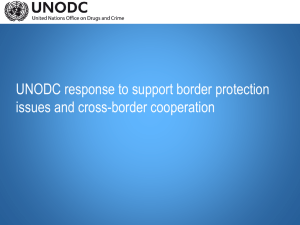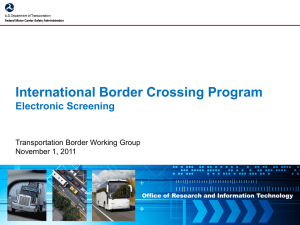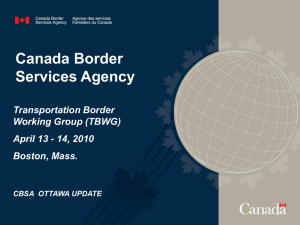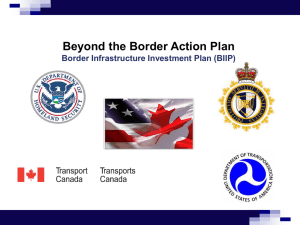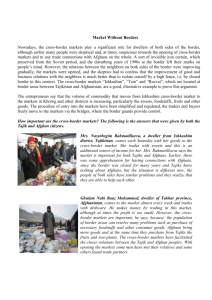Beyond the Border
advertisement
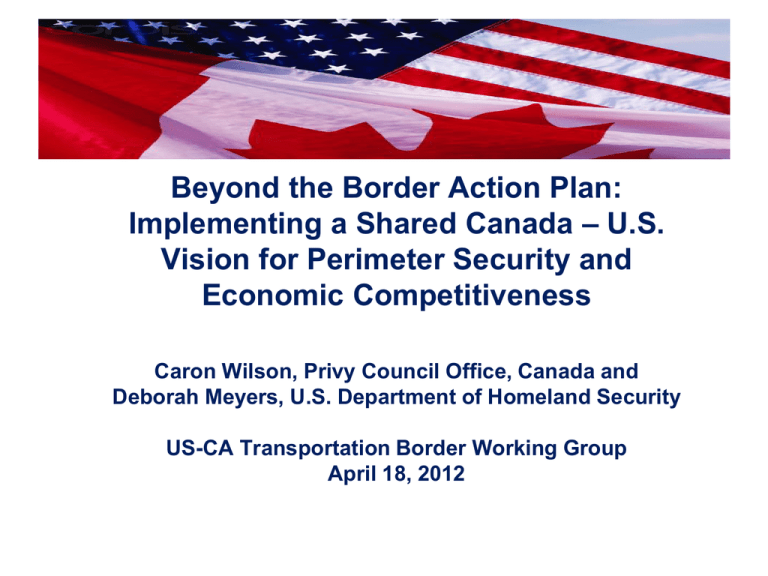
Beyond the Border Action Plan: Implementing a Shared Canada – U.S. Vision for Perimeter Security and Economic Competitiveness Caron Wilson, Privy Council Office, Canada and Deborah Meyers, U.S. Department of Homeland Security US-CA Transportation Border Working Group April 18, 2012 “Beyond the Border: A Shared Vision for Perimeter Security and Economic Competitiveness” announced by Prime Minister Harper and President Obama on February 4, 2011. “Beyond the Border Action Plan” announced by Prime Minister Harper and President Obama on December 7, 2011, and sets out specific commitments, milestones and metrics The Action Plan identifies and elaborates on four key areas of cooperation: 2 1) Addressing Threats Early 2) Trade Facilitation, Economic Growth, and Jobs 3) Integrated Cross-Border Law Enforcement 4) Critical Infrastructure and Cyber-Security The U.S.-Canada Relationship ● The United States and Canada enjoy the largest bilateral trading relationship in the world. Nearly one million dollars in goods and services cross the Canada-U.S. border every minute Mutual direct investment is over $250 billion annually Canada-U.S. two-way merchandise trade in 2010 was $502.4 billion, up from $456.9 billion in 2009, a 10% increase ● 350,000 people cross the border for business, tourism, or to visit family and friends every day. ● Critical infrastructure and communities also cross our shared border. ● By aligning resources and collaborating effectively within, at, and away from our borders, we can help expedite trade and travel, leading to economic growth and jobs and greater security for Americans and Canadians alike 1 (1) Addressing Threats Early Moving to a “perimeter” focus with shared responsibility involves: • verifying traveller identity by conducting screening at the earliest opportunity • implementing an integrated Canada-U.S. entryexit system • supporting emergency management in response to bi-national disasters • working together to address health security threats 3 (2) Trade Facilitation, Economic Growth, and Jobs: Enhancing “economic competitiveness” involves: • cooperating on supply chain security • reducing compliance burdens, particularly for small and medium sized companies • improving, aligning and expanding programs for low-risk traders • enhancing trusted traveller programs such as NEXUS • modernizing and better managing our border infrastructure • reducing red tape to lighten the overall burden of border rules • developing protocols to support the speedy resumption of trade following a potential border closure 4 (3) Integrated Cross-Border Law Enforcement: Addressing shared security threats involves: • Regularizing Shiprider operations Through Shiprider (est. 2005) Canadian and U.S. law enforcement officials conducting pilot joint patrols in shared waters on the coasts and inland • Deploying Next Generation pilot projects Draw upon the best practices of existing cross- border efforts such as Shiprider to develop the next generation initiative • Implementing radio interoperability solutions 5 (4) Critical Infrastructure and CyberSecurity: Enhancing the safety, security, and resiliency of cyber and critical infrastructure involves: • Preventing, responding to, and recovering from physical and cyber disruptions of critical infrastructure • Enhancing cross-border engagement of critical infrastructure sectors • Strengthening cyber security to protect vital government and critical digital infrastructure of national importance, and make cyberspace safer for citizens 6 To support the Beyond the Border initiatives, we will: • Enhance operational law enforcement and national security intelligence and information sharing • Law enforcement information sharing issues are being managed/addressed through the Canada-US Cross-Border Crime Forum; and • National security information sharing issues are being managed/addressed through a separate, purpose-specific forum • Develop Joint Privacy Principles • Joint Privacy Principles will guide and inform all other initiatives implemented under Beyond the Border • Reiterates that information sharing efforts will respect each country’s constitutional and legal frameworks 7 ● Led by National Security Staff and Privy Council Office ● Each initiative has timelines and lead agencies ● Canada and the U.S. will form an Executive Steering Committee at the Assistant Secretary/Assistant Deputy Minister level to oversee implementation 8 ● To measure progress and ensure accountability, there will be a joint annual, public report to the Leaders 2012 Anticipated Milestones – • Complete and release a joint statement of privacy principles • Create the first bi-national 5-year Border Infrastructure Investment Plan • Fully implement ShipRider and pilot the Next Generation of Integrated Cross Border Law Enforcement • Implement a truck-cargo pre-inspection pilot in at least one location in Canada • Launch public consultations to improve processes for facilitating cross-border business travel • Complete negotiations to allow for full preclearance of rail and maritime travelers departing from Vancouver to the United States. • Initiate an enrollment blitz for the trusted traveler program NEXUS • Extend Free and Secure Trade (FAST) benefits to members of the U.S. CustomsTrade Partnership Against Terrorism (C-TPAT) program and the Canadian Partners in Protection (PIP) program. 11 2013 Anticipated Milestones – • Provide real-time information on border wait times at the top 20 crossings • Expand NEXUS lanes and booths at several key crossings, including 4 in the Vancouver/Seattle corridor • Harmonize the trusted trader programs, C-TPAT (U.S.) and PIP (CDN) • Develop a set of measures to reduce the impacts of shared health security risks. 2014 and beyond – • Fully implement an entry/exit program at all U.S.-Canada land border crossings • Implement a bi-national radio interoperability for law enforcement and first responders • By 2015, implement passenger baggage screening technology at all CDN preclearance airports so that baggage does not need to be rescreened prior to boarding a connecting flight in the U.S. •11 Continue to enhance coordination on cybersecurity and critical infrastructure Stay informed. Read the Action Plan and fact sheets and stay up to date on milestones and outreach events at www.dhs.gov/beyond-the-border and www.actionplan.ca/border Provide feedback. Your ideas can help guide the implementation of the Action Plan. Provide feedback at public forums like this one or email your ideas to beyondtheborder@hq.dhs.gov and/or border@actionplan.gc.ca Hold us accountable. Each initiative in the Beyond the Border Action Plan has due dates – help us achieve them. Your partnership is critical in helping us reach these ambitious goals on schedule. 11

